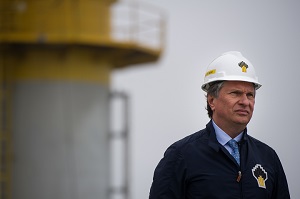Energy Market Balance Formula

Never before has a choice of further strategy been so easy for key players of the global energy market – investments cuts.
Producers, sellers and buyers have been debating for two years in an attempt to find rescue mechanisms and to return to a regulated and stable market. Unfortunately, their efforts have been so far unsuccessful. However, this by no means indicates that low oil prices will go on for a long run. I previously said that oil prices recovery is inevitable as reduction in investments lead to the lack of supply, which cannot be compensated quickly.
What is the purpose of the current price war? I think that, in the first place, it is a сompetition for a market share. And Russia is not going to keep a low profile. It is commonly known that Rosneft has the lowest lifting costs: 2.1 USD/boe (excluding taxes and transportation costs), and we are rapidly increasing our share of the global oil market. Within 10 years (from 2005 to 2015) our share in the global oil and condensate production, according to IEA grew from 1.9% to 4.9% and further increased to 5.4% after the acquisition of Bashneft. Moreover, unlike some of competitors who boost their share through dumping, we expand our presence by establishing partner relations and setting up joint ventures with key oil consumers, that is, we are building global integrated chains.
A remarkable example is Rosneft entry to the Indian market which is considered by the world leaders of oil and gas industry to be one of the most attractive and promising. In order to secure a footing in the market, we have used a transcontinental business format. Rosneft created alliances with Indian companies involving them into development of prospective oil and gas provinces in Russia. This laid the foundation for the Energy Bridge between the countries. Then, the Russian company acquired an equity share in the leading refinery of India located in the town of Vadinar. The choice in favor of this asset was determined by a high level of technological complexity of the refinery (Nelson complexity index 11.8), that will ensure outstanding project economics (average refining margin over the past 6 months is over 10 USD/bbl). Due to a significant presence in the Venezuelan market, Rosneft will be able to deliver synergies through the refining of heavy crude from Latin America at the Indian refinery facilities. In addition, a modern refinery with comprehensive infrastructure will make it possible to set an energy hub in Vadinar, supplying oil products to the markets of South-East Asia and Indian Ocean.
Such global integrated chains are currently the best way to withstand competition. In low-margin, depressed market environment, it is large complex refineries with access to several countries, that prevail, because high conversion rates and a developed geography reach provide additional flexibility on markets, subject to conjuncture and regulatory stresses. We observe that a drop in oil prices did not lead to a subsequent decrease in oil products’ prices in Europe because the feedstock cost-cutting was compensated by an increase in excise taxes. In this context, companies located in the Mediterranean have a significant potential due to their location. We are considering the increase of our presence in this market if partners offer us the mechanisms that will allow improving economic efficiency of the projects. I am confident, that a growth potential is there, and it will be unlocked – with our involvement Italian companies have already demonstrated an exemplary approach to developing a successful transcontinental business model.
We are very pleased with our successful investments in the Italian refining area. In 2013, when we acquired a stake in Saras S.p.A. for 1.37 euro per share, the price was considered elevated. Two years later we sold our stake with revenue of almost 40%, compared to the acquisition price. Pre-tax and pre-fees earnings amounted to euro 45 mln.
At the end of the day, a global approach is beneficial not only to Rosneft and its partners – the creation of an integrated energy chain, comprising production, refining and trading based on long-term contracts, is the most efficient stabilization tool for the global energy markets due to ensuring transparent interactions among all its participants. Although the regulators’ role is to be taken into consideration as it can alter every model. Mutual benefit, longtermness and trust – these are the key principles of our work.
Article by Igor Sechin, published in Corriere della sera daily